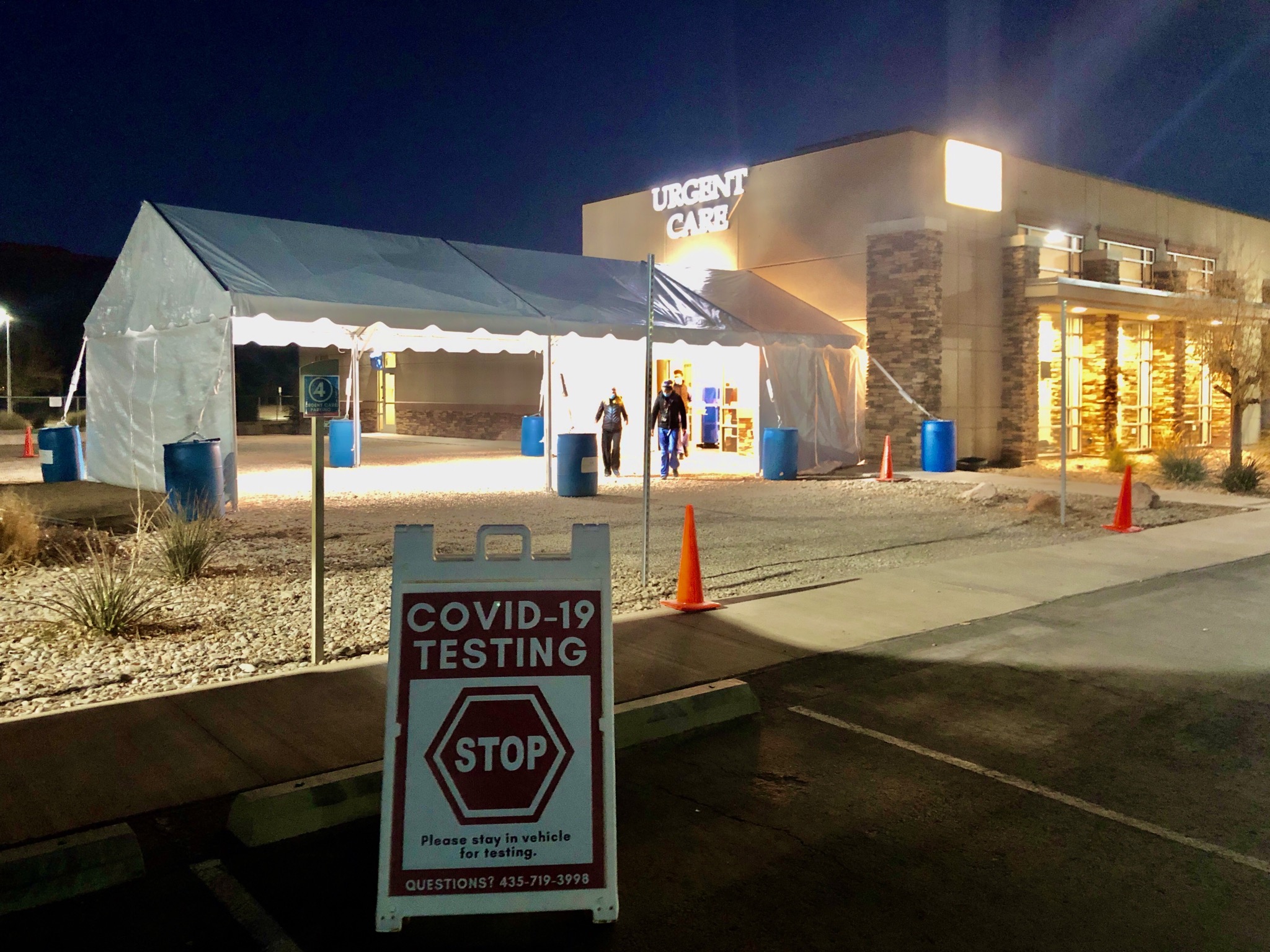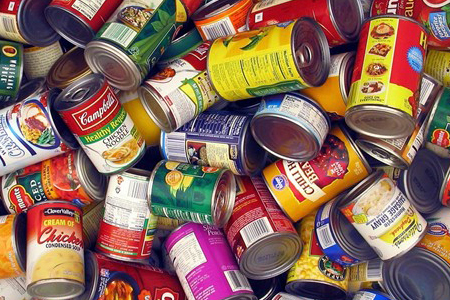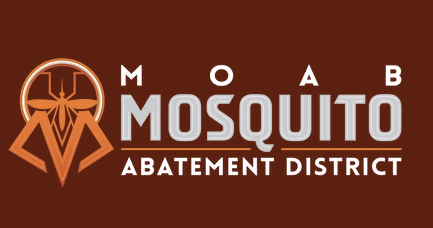Some information may be outdated.
As of Dec. 9, Grand County has an average positive test rate of around 21.13% and 42 active COVID-19 cases, as reported by the Southeast Utah Health Department. Early on in the pandemic, public health officials were concerned that high levels of travel and tourism in Moab could lead to significant infections. Though the area is currently seeing a spike in cases following a statewide trend, the region has only seen a total of 340 cases since the pandemic began—significantly lower than neighboring counties.
“Early and concrete actions early on saved us from a really challenging spring,” said Dr. Dylan Cole, the Chief Medical Officer at Moab Regional Hospital. “The situation could have been much more akin to what our surrounding counties and other resort communities experienced early on.”
Cole pointed to early interventions like an ordinance requiring public mask-wearing passed in Grand County long before a statewide mandate and an early emphasis on COVID-19 testing in the area. Such interventions helped lessen the impact of the pandemic, including allowing local schools to stay open.
“At the hospital, we have so much appreciation and thanks to the community for what they’ve done in helping keep things relatively better here than in some places,” said Cole, who emphasized that continued local precautions were necessary to avoid an increase in COVID-19 cases.
Behind the fluctuating case numbers, government mandates and ceaseless news updates, the men and women at the Moab Regional Hospital have cared for the community and kept Moab running.
In the blink of an eye, Tara Baker went from serving hundreds at an apres-ski bar in Jackson, Wyoming to manning the COVID-19 hotline at the hospital and working at the Moab Charter School.
“It changed from, ‘oh, this thing is happening out in the world’ to ‘you don’t have a job now,’” Baker recalled. “That’s quite the transition.”
Baker answers the hospital’s COVID-19 hotline and screens patients coming into the hospital for possible symptoms as a medical assistant. She described the latter as “probably the most difficult” part of her job — she takes temperatures, asks about possible exposure to the virus and surveys patients about other symptoms to make sure they receive the care they need.
“I’ve had people really put up quite a fight when I’m asking them to put a mask on to enter the hospital, even though all of our signs say you have to wear one,” she said. “People sometimes feel as if they’re being barred from access to healthcare [when being asked screening questions], and that’s really upsetting. I never want to elicit that feeling.”
Over at the coronavirus hotline, Baker and one of her colleagues, Katie Grauel, answer myriad questions from Moab residents.
Grauel, who started working at the hospital in July to help deal with the pandemic, said that most calls are about scheduling tests and what to do about potentially being exposed.
“I’m proud of our ability to achieve and maintain, for the most part, highly available testing,” said Cole. “We’ve been able to put in play both the asymptomatic screening program and keep meeting the needs for symptomatic testing.”
Cole emphasized that maintaining such accessible testing is the result of an enormous effort by many of the hospital’s departments.
“Testing is just one example. There are multiple instances like that — it continues to require a high level of flexibility, adaptability and commitment from all our staff.”
Medical experts survey the latest technology and availability and lab technicians bring the tests into the hospital and make sure they can be administered. Other employees ensure the effectiveness of the online patient portal so that patients can receive test results in a timely fashion.
“I hear people’s frustration about testing resources in Moab, and that’s beyond our control,” said Grauel. Some community members, she explained, have expressed irritation when they cannot be tested right away, or when a specific kind of test isn’t available.
On Dec. 7, the hospital erected a robust drive-thru testing tent outside their urgent care wing for the winter months, when cases are expected to surge.
Manning the hotline requires more than providing routine answers to frequently asked questions. Sometimes, Baker has had to act as a part-time therapist, talking with patients through COVID-related decisions that could seriously impact their livelihoods.
“I had to deliver positive COVID results to a woman who’s immunocompromised,” Baker remembered. “It very well may be a death sentence for her.”
“Someone that she cared about and trusted brought COVID into her home, and now she may not survive it. I cried after that phone call,” said Baker.
Baker spoke with an individual trying to decide if they should get tested for COVID-19. They’d already had the virus earlier in the year and had to miss weeks of work as a result, but they were experiencing the virus’s symptoms a second time.
“Not working wasn’t an option for them. If they tested positive again, it was pretty much going to mean that they would be homeless,” she said. “How do you do that for someone just over the phone, when they need days, if not weeks of help?”
While hospital visitors may feel frustration over access to testing or screening processes, Moab’s healthcare workers have frustrations of their own and are also experiencing “COVID fatigue.”
“It really upsets me when I see people who are so adamantly, furiously maintaining their ‘right of freedom’ by not wearing a mask or by not getting tested when it’s available,” Baker said. “It’s not about us, it’s about everybody else. We have been taught this very individualistic success story that we all feel we have to live up to, but without our communities, we have nothing.”
Often, Grauel explained, recent numbers reflect testing that was done weeks prior.
“We don’t get rewarded for good behavior immediately,” she said. “When [we all] wear your mask and wash your hands and everything else, we’re not going to see the benefits of that right away.”
To Baker, the “21st-century American” expectation of immediate gratification is something that she hopes the pandemic will change.
“We are not used to delayed rewards or having to look at the bigger picture,” she said. “Hopefully, we can come away with a different sense of time, reward and patience. Maybe we can all slow down a little bit.”
Something else Baker has noticed from working the hotline is an “interesting attitude” among people who call with symptoms.
“It’s like they’re unsure of their decision to call, as if they’re afraid they’re overreacting. I feel as if the American psyche has this deep-rooted belief that, unless you’re on your deathbed, you have to just keep going,” she said.
Baker emphasized that no one needs to feel uncomfortable when calling the hotline.
“A lot of my hotline conversations have been explaining to people that they’re doing the right thing and taking care of their community and themselves when they call,” she said.
In her conversations with residents, Baker has found hope that communities around the world can learn real lessons from the pandemic.
“I have never been so welcomed into a community as how I’ve felt in Moab, and if we could just pull a little bit tighter, we’re so close,” she said. “There is light at the end of the tunnel.”
“We want to show our appreciation and thanks to the community for what they’ve done in helping keep things relatively better here,” said Cole. “But it’s going to get worse before it gets better. So hang in there.”
Medical professionals recommend continued hand-washing and wearing masks in public to control the spread of the coronavirus. Those who show any symptoms of COVID-19 are encouraged to get tested at Moab Regional Hospital. To talk to a nurse about symptoms and schedule a test, call the Coronavirus Hotline at 435-719-3998.
“Early and concrete actions” helped Grand avoid more COVID-19 infections
Appreciate the coverage? Help keep local news alive.
Chip in to support the Moab Sun News.




